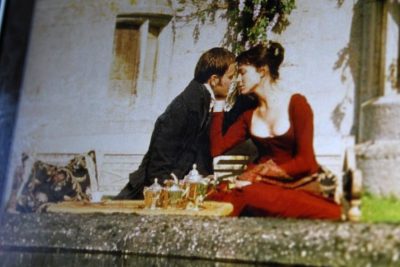A majestic landscape portrait of the lush English countryside complimented by a burning romance and an inheritance plight, British costume dramas are perhaps one of the most textbook genres.
Patricia Rozema’s “Mansfield Park” is far more than an exception.
The 1999 release is perhaps best known for its extreme disconnect from its source material — the novel of the same name by Jane Austen — as well as a mass of favorable and unfavorable reviews. But, “Mansfield Park” deserves more attention.

The film tells the story of Fanny Price — played by Frances O’Connor — a lower-class woman who is taken in by her wealthy uncle and follows her as she falls in and out of love with an outsider who comes from wealth.
What’s perhaps most striking about Rozema’s rendition of “Mansfield Park” is her employment of narrative techniques. Filled with fourth-wall breaking and broken narration, Rozema cleverly adapts Austen’s novel in an abstract manner.
That said, Rozema falls short on handling one key element of Austen’s novel: slavery. For a novel that rotates around the ethics and complications of the Atlantic slave trade, the audience expects a film adaption to address the Fanny’s uncle’s source of wealth. Rozema instead aims to scare the viewer — quite literally — through scaring Fanny as she flips through a notebook of graphic drawings of slaves and their torture, and she and the audience are told to forget about it.
In some terms, Rozema’s approach to the discussion of slavery is fitting to the period as well as the overall theme of conservatism, which lingers on the rich and the poor in different ways. It’s a shame Rozema cannot fully counteract such a traditionalist approach to the subject, but it is not a surprise.
“Mansfield Park” delivers an overall fulfilling story of finding love through an abiding nature, either via proxy or with great strife. Fanny is a complex character. She wants nothing more than to be happy and not incite any harm to the people around her. Outsiders hurt her in almost a helpless ploy of romanticism and self-benefit. That is how we are meant to understand anyone on the outside: dangerous.
Let me be clear that this film is in no way menacing — it is quite literally the opposite. Narration, as mentioned, anchors the film and serves as a driving force for the plot. The narration itself is cleverly witty, as are the characters’ actions and dialogue. Perhaps what is most surprising about the film is how perfectly humorous it is. But then again, we should thank Austen for that.
“Mansfield Park” is, above anything, a clever and humorous take on conservatism and social class. “Mansfield Park” is also incredibly refreshing. It is not drowned in romance, as Austen’s work tends to be. Austen’s novels typically balance humor and romance well, but “Mansfield Park” places a higher emphasis on Fanny’s — and more so, a woman’s — values than societal norms.
In such a melodrama, we expect the plot to be stuck in a love triangle and a constant struggle between classes, which does exist in some form, but one has to give proper credit to Rozema and the entire cast for transposing the livelihood of the period as well as the pain of not being able to fully be oneself.
Triumphant in its dissection of class and politics through proper wit, “Mansfield Park” is an encapsulating tale, but burdened by its neglect of serious societal ills.














